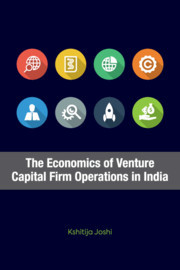Description
The Economics of Venture Capital Firm Operations in India
Author: Joshi Kshitija
Language: English
Subject for The Economics of Venture Capital Firm Operations in India:
Publication date: 10-2020
214 p. · 15.8x23.5 cm · Hardback
214 p. · 15.8x23.5 cm · Hardback
Description
/li>Contents
/li>Biography
/li>
This book studies diverse categories of venture capital (VC) firms in India based on their ownership type (domestic vs foreign), stage of investment (early vs growth stage) and VC investment team composition (entrepreneurial experience vs investing experience). For each category of VC firms, the nuances in their investment, portfolio involvement and exit strategies are separately analysed. Employing the framework of information asymmetry, the book studies how different categories of VC firms rely on distinct mechanisms such as deal syndication and domain specialization to address the ensuing adverse selection and agency risks. It also delves into the macro context by assessing whether the emergence of VC in India has been driven by 'pull' or 'push' factors. This is accomplished by analysing in depth the supply and demand of VC funds. Finally, it critically reviews the existing policies of entrepreneurial finance and arrives at recommendations for future directions of the same.
1. Introduction; 2. Ecosystem and strategic decision making; 3. Context and methods; 4. Fund raising: systematic and non-systematic influences; 5. High-tech clusters in India; 6. Investment strategies; 7. Involvement and value-add in investee ventures; 8. Venture capital exits: what drives success?; 9. Conclusion; References; Index.
Kshitija Joshi is Assistant Professor at National Institute of Advanced Studies, Indian Institute of Science, Bangalore. She is part of the Reserve Bank of India programme on interdisciplinary approaches to economic issues, which aims to probe core economic problems using the lens of non-economic disciplines. Dr Joshi is currently working on a project that assesses the Demand side of Financial Inclusion in rural Karnataka – in particular, the contours of formal and informal finance.
© 2024 LAVOISIER S.A.S.
These books may interest you

Venture Capital PerformanceA Comparative Study of Investment Practices in Europe and the USA 160.25 €



